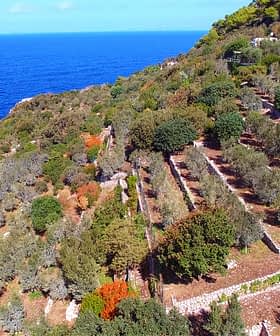Bacteria in Table Olives May Help Eliminate Heavy Metals During Digestion
The same genetic traits that allow the Lactobacillus pentosus bacteria to survive the table olive fermentation process may also help the microorganisms to bioquench and eliminate harmful heavy metals.
 Lactobacillus pentosus bacteria under a microscope. Photo courtesy of the University of Jaén
Lactobacillus pentosus bacteria under a microscope. Photo courtesy of the University of JaénA group of researchers from the University of Jaén have identified a strain of bacteria found in table olives that may help the human body to bioquench heavy metals during digestion.
Lactobacillus pentosus, the bacteria responsible for the bioquenching, is naturally occurring in the olive tree. Its presence is amplified during the fermentation process, through which table olives go in order to remove the naturally bitter taste of the fresh fruit.
These bacteria act as a sponge that traps these types of particles, reducing their availability in the digestive system and eliminating them through feces.
The researchers found that the bacteria coats the lining of the intestine and prevents molecules of heavy metals, such as arsenic, cadmium or mercury, from being digested and entering the bloodstream.
All three of these heavy metals are known to be toxic to humans and are nearly impossible for the body to eliminate once they have been absorbed.
See Also:Olive Oil Health Benefits“These bacteria act as a sponge that traps these types of particles, reducing their availability in the digestive system and eliminating them through feces,” Hikmate Abriouel, one of the study’s authors and a researcher at the university, said.
While the Lactobacillus pentosus bacteria are naturally occurring, they become concentrated during the fermentation process.
The limited availability of nutrients, high salinity and low pH of the brine, along with the presence of antimicrobials, such as phenolic compounds and oleuropein, creates a harsh environment for bacteria to survive and reproduce in.
However, the researchers discovered that the Lactobacillus pentosus bacteria contains genes that allow it to survive in the hostile brine environment, due to its ability to metabolize certain carbohydrates and the unique structure of the bacteria’s cell membranes.
It is due to these adaptive mechanisms, the researchers concluded, that the bacteria is also able to bioquench the heavy metals.
“The bacteria that allow these particles to be retained are in the olive already in the tree,” Abriouel said. “When it undergoes fermentation, these microorganisms proliferate because of their ability to grow in an environment with low pH and also, as we have seen, in the presence of these heavy metals, which they can trap.”
The researchers also compared the ability of the Lactobacillus pentosus bacteria to bioquench the heavy metals both before and after having been fermented. They found that the bacteria were far more effective in doing so post-fermentation.
“In bacteria, plasmids [small DNA molecules within a cell that are separated from the chromosomal DNA] harbor an additional genetic material present in the chromosome, which are involved in various processes such as resistance to pathogens or antibiotics,” Abriouel said. “Fermentation allows these bacteria to grow and in that habitat they express a series of genes, such as this one [that helps bioquench the heavy metals], whose purpose is to allow it [the bacteria] to exist and subsist in the environment.”
Indeed the researchers found that post-fermentation, the Lactobacillus pentosus bacteria experience a two to eight-fold increase in their ability to bioquench the heavy metals.
In the study, the researchers investigated this process in the Aloreña variety of olive, which has a Protected Designation of Origin (PDO) status from Malaga.
The researchers said they plan to continue studying the Lactobacillus pentosus bacteria in other varieties of olives as well, in order to further understand its relationship with heavy metals.
The results of their first study have been published in the journal Nature.








